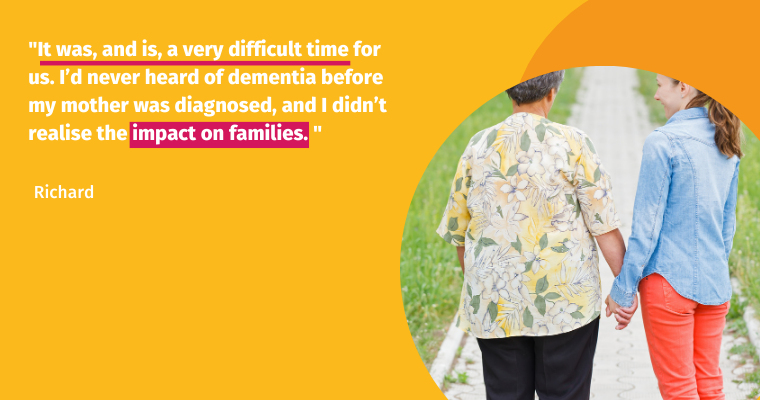
Did you know over 88,000 people are living with dementia in Rhondda Cynon Taf, Bridgend and Merthyr Tydfil?
Many of us have heard of dementia, but what is it?
The Alzheimer’s Society describes dementia as ‘a set of symptoms that over time can affect memory, problem-solving, language and behaviour.’
Alzheimer’s disease is the most common type of dementia, but there are many others.
Receiving a dementia diagnosis can be daunting, however it is much better to know so people can seek the treatment and support they need.
Every year the Alzheimer’s Society (15th -19th May) marks Dementia Action Week. The annual campaign encourages people to ‘act on dementia’. This year’s focus is on ‘seeking diagnosis’, and will raise awareness of the symptoms to look out for, and the benefits of getting a diagnosis.
With so many families affected by dementia, it’s important to hear their experiences.
Peggy was diagnosed with dementia two years ago. Her son, Richard, shares their story.*
Hello, Richard. Please tell us about Peggy before she was diagnosed?
My mother loved gardening and caring for others. She always wanted to treat her family and friends, and never spent a penny on herself! She’d always be there for others, and if somebody needed something, she would go out of her way to help them. She still is a wonderful, caring person

When did you first realise Peggy wasn’t being herself?
We used to go on family days out, and we noticed my mother kept on forgetting things and going off into her own little world. I remember one day, we went on a day trip to Ogmore and it was windy and she lost her balance – we didn’t think much of it because the weather wasn’t great, and we put it down to that. Then on another outing to Brecon, she fell in the toilet and hit her head on the door. My mother started to experience hallucinations and her personality altered – she was getting more irritable than usual. She was craving sweet foods all the time, like biscuits and cakes.
When we checked, we realised she hadn’t been taking her regular tablets properly. With all the other symptoms, we knew something was seriously wrong.

What did you do next?
We went to the GP, and he suspected her symptoms could be dementia. The GP referred us to a memory assessment team who came to the house, and asked my mother to draw a clock and tell them what year it was.
She wasn’t able to do these things so she was she was put under a consultant in the hospital who assessed my mother, and diagnosed her with dementia. He explained the diagnosis to us very well, and mum understood what he was saying

What support did Peggy and your family receive after diagnosis?
It was, and is, a very difficult time for us. I’d never heard of dementia before my mother was diagnosed, and I didn’t realise the impact on families. It’s so hard seeing somebody you love disappearing in front of your eyes.
The consultant prescribed some tablets which slow down my mum’s dementia. However what has made the biggest difference has been the practical support from services.
The occupational therapists, including Zoe, Emma, Danielle and Angela, at Cwm Taf Morgannwg University Health Board have been fantastic. Without their help, we would have really struggled.
They organised for my mother to go to a memory clinic at Cynon Linc, Aberdare, on a Friday. She loves going there as they do lots of fun activities, including bingo, afternoon tea, playing games, having a sing song and even watching a comedian. She enjoys it so much, she’s often ready to go at 6.30am on a Friday!
They also cook a really nice dinner with her. We were worried she was eating too many sweet things, so we are happy she gets healthy and tasty meals at the centre.

Going to the centre has also changed the way my mother views her dementia.
They helpfully arranged somebody to come and speak about dementia to everyone. From then on, she hasn’t felt alone. She broke down in tears of relief knowing she wasn’t the only person living with dementia, and it has helped her to come to terms with it.
The occupational therapists have really helped with the practical support at home too. My mother can’t cook anymore, so they have put coloured dots on the microwave to help her understand how long to heat a meal for. For example, a red dot may mean one minute, and a green dot may mean two minutes.
Mum also has a very special neighbour called Daisy who she has known for over 40 years. Daisy checks in on mum every morning, and makes sure she has her tablets and is eating properly. It gives us peace of mind to know she has such a wonderful person living next door, and she means the world to us.
The social side of things has been so important. All of the support is like a different type of medication – it really gives her a lift, and helps her on her down days.

Finally, what advice would you give to somebody who is worried about themselves, or a loved one?
Please go to the GP as soon as you can, and ask for support. You can start the journey to getting answers and help. I was so grateful to receive the information I did. It has helped us all to know how to look after my mother, and understand how to give her a good quality life while living with dementia.
Thank you so much to Richard and his wife Jane for speaking with us.
In March 2023, we launched a new campaign to raise standards and improve dementia care across Rhondda Cynon Taf, Bridgend and Merthyr Tydfil called ‘enhancing lives by raising standards and improving dementia care.’
Through the campaign we hope to make care and support better for the 88,317 people living with dementia in the region.
The campaign supports local delivery of the ‘All Wales Dementia Care Pathway of Standards’, which were created by Improvement Cymru in collaboration with people living with dementia, carers, and health and social care professionals.
Get involved in our campaign and learn more here:
https://www.ctmregionalpartnershipboard.co.uk/dementiacampaign/
*Names have been changed. Images are stock.

We are proud to be members of
Co-Production Network for Wales.
We are proud to be members of
Co-Production Network for Wales.
